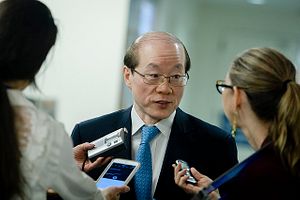Liu Jieyi, 60, served as China’s ambassador to the United Nations from August 2013 until last month. Now he has taken up a new position as the deputy head of China’s Taiwan Affairs Office (TAO), on the eve of the opening of Chinese Communist Party (CCP)’s 19th National Congress. It’s widely rumored that Liu’s promotion to the head of the TAO may be in the offing.
According to TAO’s newly updated staff list, Liu ranks top among the four deputy heads. TAO lists Liu’s rank as equivalent to a minister, which means Liu and Zhang Zhijun, the current head of TAO, share equal standing in rank. Meanwhile, Zhang, 64, who has served as the head of TAO for four years, is likely to retire when he reaches 65 — the normal retirement age in China — after the leadership reshuffle this month. Liu is poised to slide into the top spot and such a move would make sense, given his experience and the peculiarities of the Taiwan issue.
Prior to his position as China’s ambassador to the UN, Liu mainly worked on international affairs, U.S. affairs in particular, in the Chinese foreign ministry. While he does not have specific experience in Taiwan affairs, such a transition is not unusual. For example, Zhang also mainly worked on U.S. affairs in the Chinese foreign ministry before his appointment to TAO.
What’s different is that Liu has more experience in multilateral organizations and international negotiations. In late September, Liu published an article in the People’s Daily elaborating on international governance and China’s new foreign policy under the leadership of Xi Jinping. He specially mentioned that “The world today is experiencing a period of big change and big adjustment.”
While anything involving Taiwan is officially termed by Beijing as an internal affair, the government would seem to be valuing Liu’s international experience in handling the issue.
Since Taiwan’s leader Tsai Ing-wen came into office in 2016, the cross-Strait relationship has deteriorated. TAO has stopped a regular dialogue mechanism with Taiwan’s counterpart, the Mainland Affairs Council. It is the only official pipeline between the two governments across the Strait. TAO’s spokesperson said the shutdown was because of Tsai’s reluctance to acknowledge the “1992 consensus,” or the One China Principle.
During U.S. Secretary of State Rex Tillerson’s visit in China in late September, Beijing restated China’s stance on Taiwan, among other, more pressing, issues such as the North Korean crisis and U.S. President Donald Trump’s upcoming trip to China. In the meeting with Tillerson, Chinese Foreign Minister Wang Yi “demanded the U.S. side earnestly respect China’s concerns, appropriately handle the relevant issue and avoid bringing disturbances to China-U.S. relations.” In comparison, China rarely mentioned this topic during the eight-year administration of Ma Ying-jeou in Taiwan.
Liu, as a diplomat with long history engaging the United States, may play a critical role in balancing the complicated triangular relations between Washington, Beijing and Taipei should he move from deputy to head of TAO in the near future.
In addition, Liu’s wife, Zhang Qiyue, who is also an experienced Chinese diplomat, has strong ties in the United States. She is currently serving as the Consulate General in New York.
There is the assumption that Taiwan could be used as bargaining chip in future negotiations between the United States and China, something Tsai is well aware of. She told Taiwan’s Central News Agency recently in an interview, “I will observe the interactions between the United States and mainland China, and the overall situation in Asia.”































